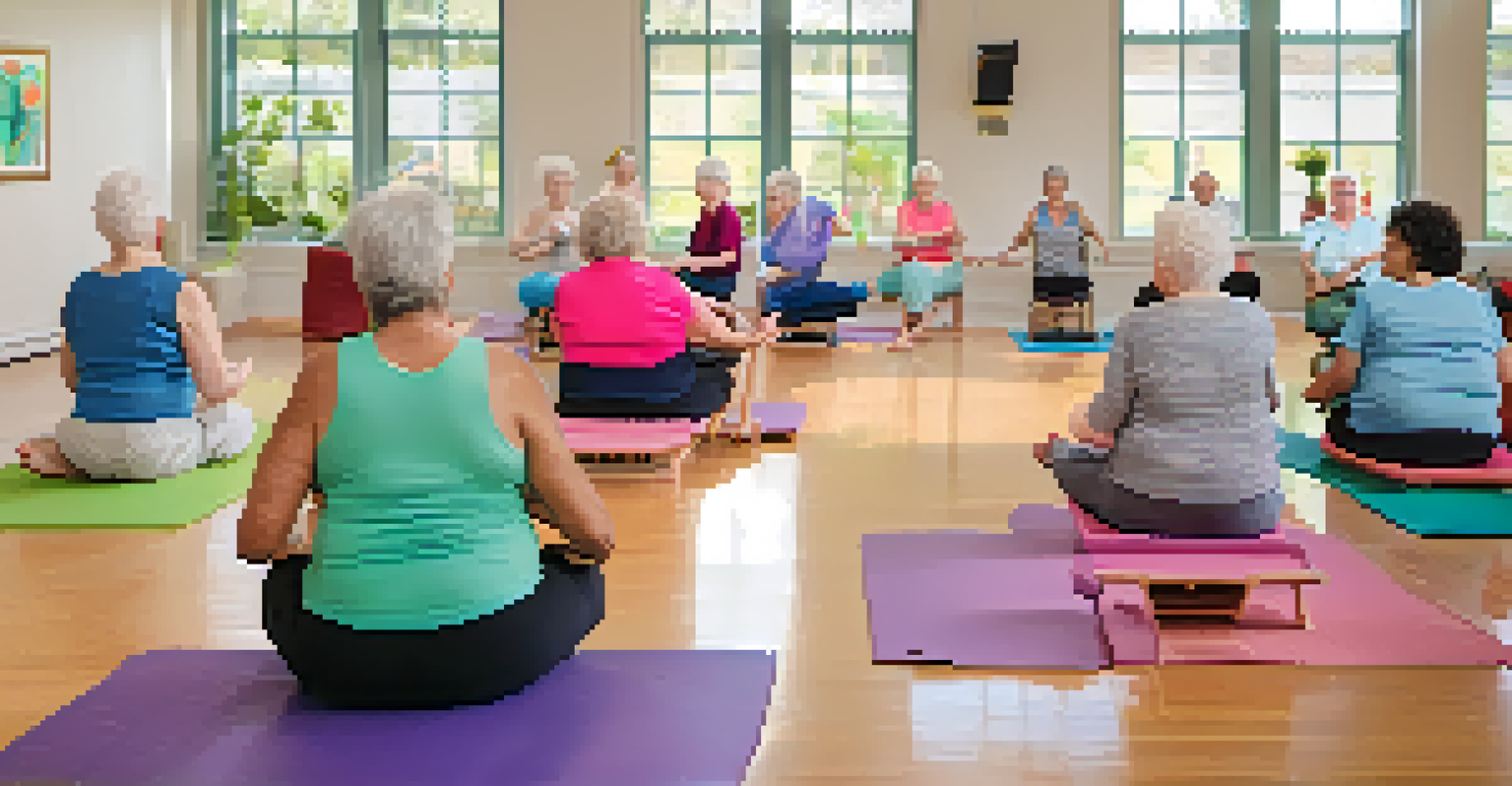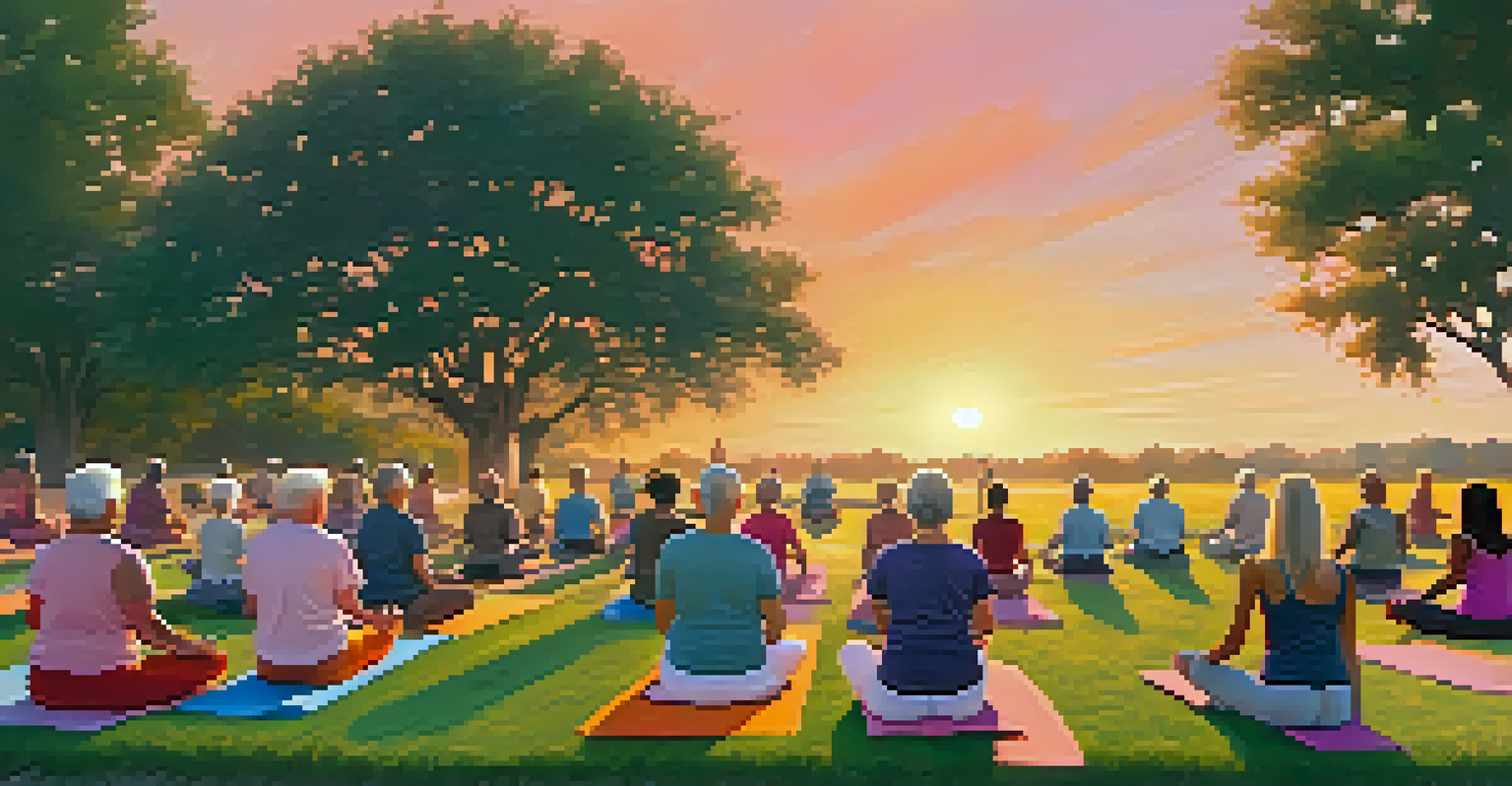Yoga and Aging: Developing a Mind-Body Connection

Understanding Yoga's Role in Aging Gracefully
As we age, embracing practices that promote overall well-being becomes essential. Yoga is one such practice that not only enhances physical flexibility but also nurtures mental clarity. This ancient discipline helps create a harmonious balance between body and mind, making it particularly beneficial for older adults.
Yoga is the journey of the self, through the self, to the self.
Research shows that regular yoga practice can improve mobility, reduce stress, and even enhance cognitive function. It’s a holistic approach that addresses both physical challenges and emotional well-being, allowing individuals to age gracefully. This is vital as the aging process often brings about physical limitations and mental health challenges.
Incorporating yoga into your routine can be a transformative experience. By focusing on breath, postures, and mindfulness, yoga promotes a deeper connection with oneself, paving the way for improved quality of life as we grow older.
The Mind-Body Connection: What It Means
The mind-body connection refers to the correlation between our mental and physical states. It's the idea that our thoughts, feelings, and attitudes can influence our body's physical health. For older adults, nurturing this connection can lead to better health outcomes and overall happiness.

In yoga, this connection is emphasized through breathwork and mindful movements. Practicing yoga encourages us to listen to our bodies and recognize how our emotions may manifest physically. For instance, tension in the shoulders might signal stress, prompting us to address underlying emotional issues.
Yoga Enhances Aging Gracefully
Regular yoga practice improves mobility, reduces stress, and fosters mental clarity, making it beneficial for older adults.
Understanding this connection is crucial for aging individuals. By becoming more aware of how our mental state affects our physical health, we can take proactive steps toward achieving balance, ultimately enhancing our quality of life.
Benefits of Yoga for Older Adults
Yoga offers numerous benefits that are particularly advantageous for older adults. These include improved flexibility, strength, and balance, which are essential for preventing falls and injuries. Gentle yoga practices can help maintain mobility and promote joint health, making daily activities easier.
The mind is everything. What you think you become.
Additionally, the relaxation techniques found in yoga can significantly reduce stress and anxiety levels. This is vital since many older adults face loneliness and isolation, which can impact mental health. By engaging in a regular yoga practice, one can foster social connections through classes or community groups.
Moreover, yoga encourages mindfulness, which helps in cultivating a positive outlook on life. This mental shift can lead to better emotional resilience during challenging times, making yoga an invaluable tool for aging with grace.
Finding the Right Yoga Style for You
With various styles of yoga available, finding the right one can enhance your experience and benefits. Hatha yoga, for instance, is gentle and focuses on basic postures, making it ideal for beginners and older adults. On the other hand, restorative yoga emphasizes relaxation and is perfect for those seeking stress relief.
Chair yoga is another excellent option, allowing individuals with limited mobility to participate fully. It incorporates seated postures and can be adapted to meet various physical needs. Finding a class that matches your comfort level and physical ability is key to enjoying yoga.
Mind-Body Connection Matters
Understanding the mind-body connection helps older adults take proactive steps toward better health and emotional well-being.
Exploring different styles and classes can help you discover what resonates with you. Don’t hesitate to ask instructors for recommendations based on your personal needs; they can guide you in selecting a practice that’s both enjoyable and beneficial.
Creating a Consistent Yoga Practice
Establishing a regular yoga practice is essential for reaping its full benefits. Consistency can be as simple as setting aside a few minutes each day to practice at home or attending weekly classes. The key is to create a routine that feels manageable and enjoyable.
Incorporating yoga into your daily life can also mean finding moments to practice mindfulness throughout the day. This could be as simple as taking a few deep breaths before meals or stretching during breaks. These small practices can lead to significant improvements in mental and physical well-being.
Remember, the journey of yoga is personal and should be adapted to fit your lifestyle. Celebrate your progress, no matter how small, and allow yourself the flexibility to evolve your practice over time.
Mindfulness: The Heart of Yoga Practice
Mindfulness is a fundamental aspect of yoga that can greatly enhance the aging experience. By focusing on the present moment, individuals can cultivate a deeper sense of awareness regarding their bodies and emotions. This practice enables one to respond to challenges with greater clarity and calmness.
In yoga, mindfulness is developed through breath control and meditation. These techniques help to quiet the mind, allowing for a more profound connection to oneself. As we age, this practice becomes an invaluable tool for managing stress and navigating life’s transitions.
Find Your Perfect Yoga Style
Choosing the right yoga style, such as Hatha or chair yoga, can enhance the experience and benefits tailored to individual needs.
Ultimately, mindfulness in yoga fosters a sense of peace and acceptance, which can be particularly beneficial as we face the changes that come with aging. By cultivating this mindset, we can approach life with greater joy and resilience.
Incorporating Yoga into a Holistic Lifestyle
Integrating yoga into a holistic lifestyle means considering all aspects of well-being, including diet, social connections, and mental health. Yoga encourages a mindful approach to these elements, promoting healthier choices that align with personal values. For example, mindful eating can enhance your yoga practice by nurturing your body and spirit.
Moreover, engaging in community activities, such as group yoga classes or workshops, can foster social connections and combat feelings of isolation. Building relationships with like-minded individuals can create a support system that enhances the overall experience of aging.

By viewing yoga as part of a broader lifestyle, we can create a sustainable approach to health and wellness. This holistic perspective not only enriches our yoga practice but also transforms our daily lives, leading to more fulfilling experiences as we age.